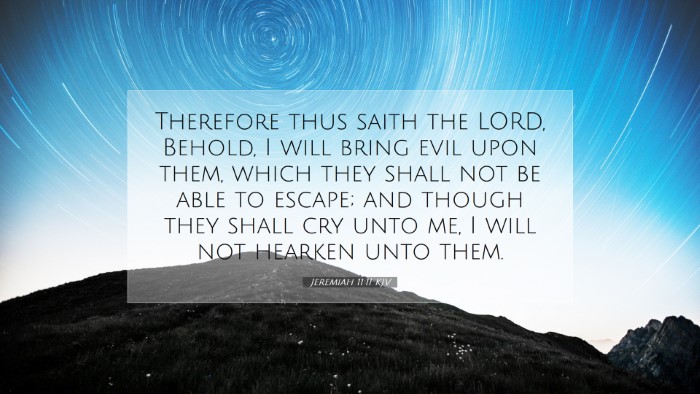Commentary on Jeremiah 11:11
Jeremiah 11:11 states:
"Therefore thus saith the Lord, Behold, I will bring evil upon them, which they shall not be able to escape; and though they shall cry unto me, I will not hearken unto them."
Overview
This verse is a profound declaration from God regarding the fate of His people due to their disobedience and covenant unfaithfulness. Here, the Lord reveals a promise of impending judgment as a consequence of their actions, emphasizing His sovereignty and righteousness in dealing with Israel.
Theological Implications
The verse highlights several crucial theological insights:
- The Justice of God: The impending "evil" referred to is not arbitrary but a reflection of divine justice. God acts on behalf of His covenant obligations, responding to the people's rebellion.
- Covenantal Relationship: The mention of a covenant is central. The Israelites, despite their identity as God's chosen people, face grave consequences for their failures.
- The Nature of Divine Judgment: God's refusal to listen to their cries illustrates the seriousness of their transgressions and serves as a warning about the severity of divine retribution.
Insights from Matthew Henry
Matthew Henry emphasizes that God's judgments are a result of His covenant with Israel. He explains that after repeatedly warning them through prophets, their fate had become inevitable. Henry notes:
"When God’s judgments are denounced, we may see how utterly helpless those are who are guilty and how tormented with fear they may be."
This highlights the futility of seeking escape from divine will when one remains in rebellion.
Insights from Albert Barnes
Albert Barnes points out the gravity of "evil" as mentioned in the verse. He interprets this as not just misfortunes but a comprehensive disaster that encompasses the soul and nation:
"The evil brought upon them is the result of their own actions, and it is a demonstration of their complete separation from God’s protection and guidance."
Barnes affirms that this impending calamity serves both as a punishment and a means for the people to realize the consequences of turning away from God.
Insights from Adam Clarke
Adam Clarke reflects on the prophetic nature of Jeremiah's words, noting that the prophecy speaks to the eventual fall of Jerusalem:
"What is laid upon them is a clear sign of the abandonment of divine protection; they will cry, yet their cries will not be heard due to the obstinance of their hearts."
Clarke emphasizes the notion that cries for mercy, when devoid of genuine repentance, may not gain God's attention.
Application for Pastors and Theologians
This passage serves as a stark reminder of the importance of fidelity to God's commands. It encourages leaders within the church and theological thought to consider the following implications:
- Leadership Responsibility: Pastors must guide their congregations toward faithfulness, ensuring that they are aware of both God’s grace and the seriousness of sin.
- The Role of Prophecy: Recognizing the ongoing role of prophetic voices in the church can serve as a form of guidance and warning regarding societal and individual conduct.
- The Reality of Judgment: Understanding that God's judgment can manifest in various forms helps leaders to address issues of sin and societal decay effectively.
Conclusion
Jeremiah 11:11 reverberates with implications that extend beyond the historical context of Israel. It serves as a call to reflection for all believers regarding their relational integrity with God. The insights drawn from these esteemed commentators deepen our understanding of God’s character: His justice combined with His yearning for His people to return to Him.
Future sessions of theological discourse should revisit this verse, recognizing not merely the historical context but its relevance to contemporary Christian life and practice.


